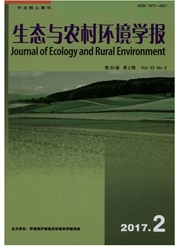

 中文摘要:
中文摘要:
在金华市主要中药材种植区采集耕作层土壤和中药材样品,分析其重金属含量,并从环境地球化学角度分析中药材重金属超标的原因.结果表明,白术(Rhizoma Atractylodis Macrocephalae)、玄参(Radix Scrophulariae)和浙贝母(Bulbus Fritillariae Thunbergii)中Cd超标率分别为64.3%、40.0%和47.2%,白术、玄参和元胡(Rhizoma Corydalis)中Cu超标率分别为35.7%、10.0%和5.9%.从中药材对重金属的选择性吸收、种植区的土壤环境、地形地貌和气候条件等方面研究发现,气候温暖湿润,地形陡峭,岩石在风化成土过程中淋溶作用强烈,从土壤母质、淋溶层到土壤表层pH值逐渐降低,土壤酸化是导致中药材Cd和Cu含量超标的主要原因.
 英文摘要:
英文摘要:
Samples were collected of soils from the plow layers of the major Chinese medicinal herbs production areas in Jinhua and of the Chinese medicinal herbs produced therein for analysis of heavy metal contents and causes of their overproof rates from the environmental geochemical aspect.Results show that the Cd overproof rate in Rhizoma Atractylodis Macrocephalae,Radix Scrophulariae and Bulbus Fritillariae Thunbergii is 64.3%,40.0% and 47.2%,respectively,and the Cu overproof rate in Rhizoma Atractylodis Macrocephalae,Radix Scrophulariae and Rhizoma Corydalis is 35.7%,10.0% and 5.9%,respectively.It was found through studies on the characteristics of Chinese medicinal herbs selectively absorbing certain heavy metal elements,soil environment of the herb growing areas,topographic and climatic conditions that the warm humid climate,steep terrain,strong eluviation in the process of pedogenesis through weathering of rocks,decreasing pH from soil parent material,eluvial horizon to plough layer and soil acidification are the major causes leading to overproof Cu and Cd in the Chinese medicinal herbs.
 同期刊论文项目
同期刊论文项目
 同项目期刊论文
同项目期刊论文
 期刊信息
期刊信息
